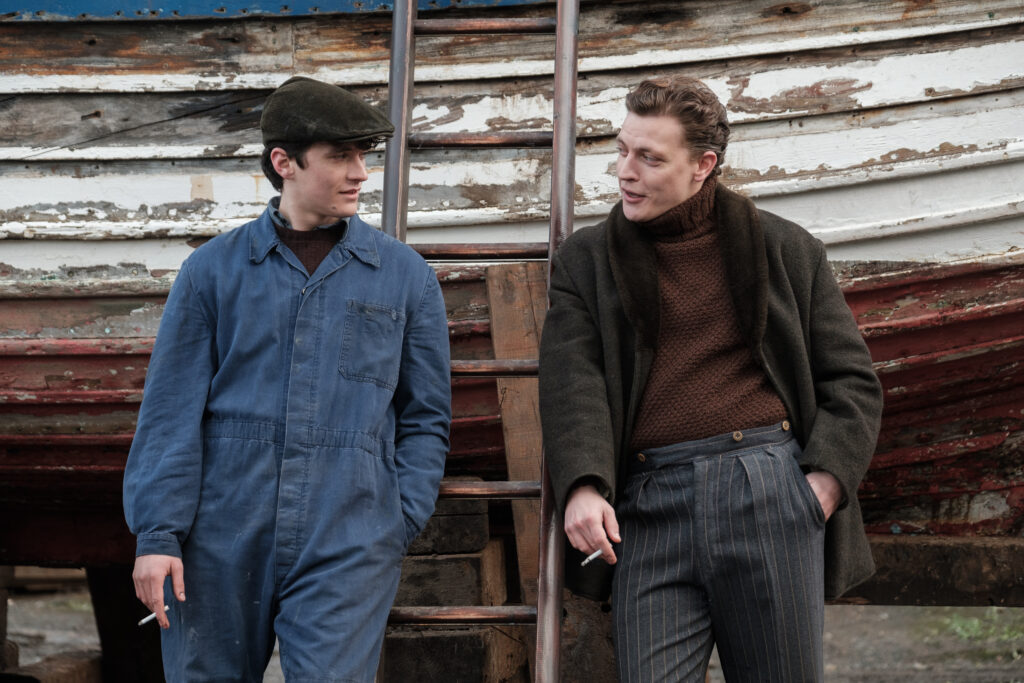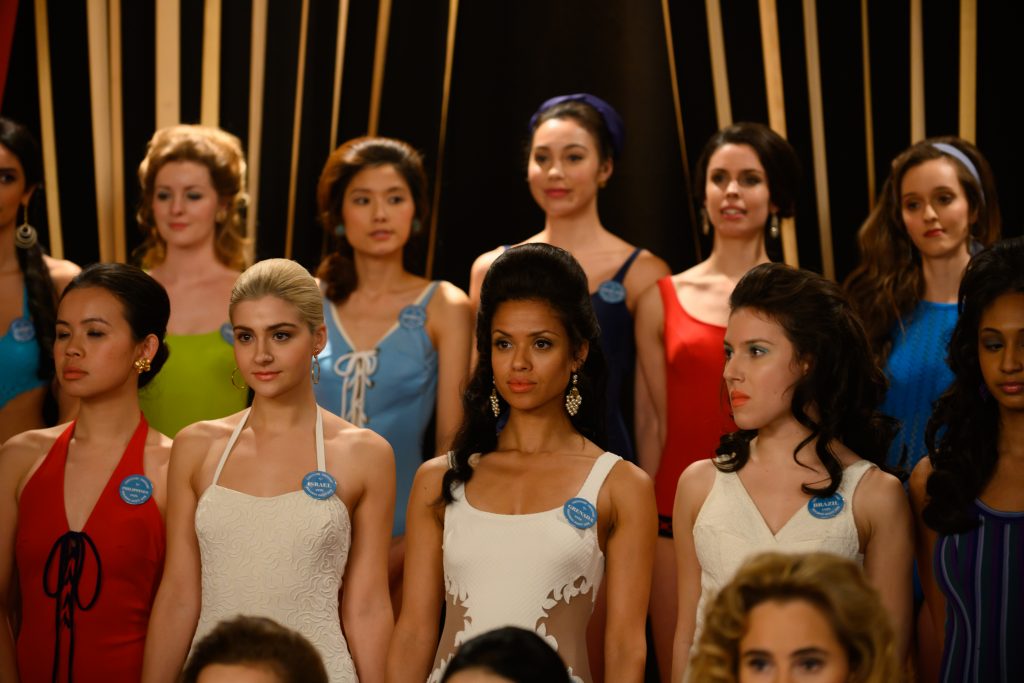May 9, 2022
by Carla Hay

Directed by Roger Michell
Culture Representation: Taking place primarily in the United Kingdom cities of Newcastle and London, in 1961 and briefly in 1965, the comedy/drama film “The Duke” features a cast of nearly all-white characters (with one person of Pakistani heritage) representing the working-class and middle-class.
Culture Clash: An anti-establishment senior citizen, who is grieving over the years-ago death of his teenage daughter, pleads not guilty in his trial for stealing Francisco Goya’s portrait of the Duke of Wellington from the National Gallery in London.
Culture Audience: “The Duke” will appeal primarily to people interested in old-fashioned but well-acted period dramas about feisty and opinionated British people that explore issues of rebelling against society and dealing with personal grief.

“The Duke” is more than just a traditionally made movie about a man who goes on trial for stealing a valuable painting from London’s National Gallery. It’s also a witty and emotional drama about a family coping with grief. Based on a true story, “The Duke” is not as predictable as it might seem. The cast members greatly elevate the material, which might have become too lackluster or misguided with the wrong people cast in the roles.
Directed by Roger Michell (who passed away in 2021, at the age of 65), “The Duke” (which takes place in England, mostly in 1961) is really three stories in one, in telling what happened in the year of the life of 60-year-old Kempton Bunton (played Jim Broadbent) before, during and after he was put on trial for a famous art theft. The movie (written by Richard Bean and Clive Coleman) focuses mostly on the “before” part of the story, which is somewhat a detriment to the flow of the narrative, which needed to give more screen time to the trial.
Kempton, who lives in Newcastle, is a spunky nonconformist with a keen sense of questioning government authority and wanting to be a champion for underdogs and underprivileged people. He is a taxi driver by trade, but early on in the story, he gets fired from his taxi job. On the day that Kempton gets fired, his no-nonsense supervisor Freda (played by Val McLane, in a scene-stealing cameo) starts off by telling Kempton that she’s been getting customer complaints that he talks too much. More importantly to the boss, Kempton has also been falling short of handing over the company’s commission for his taxi cash earnings. He’s not exactly accused of stealing, but Kempton’s excuses aren’t good explanations for the missing commission money.
Kempton mumbles something about how he took pity on a cab rider who couldn’t afford to pay the fare. Freda tells Kempton, “I might have the body of a weak and feeble woman, but I’ve got the testicles of Henry VIII … I am running a taxi firm, not a charity!” When Freda decides to fire Kempton without paying him the salary that he’s owed, he disagrees with her, and she barks at him: “Sue me then. But fuck off first!”
Kempton’s loyal but frustrated wife Dorothy Bunton (played by Helen Mirren) has gotten fed up with Kempton’s erratic employment. Dorothy is essentially the main breadwinner for the household. She works as a housekeeper for a wealthy middle-aged couple, whose husband is a prominent doctor in the area. Kempton and Dorothy have two sons, both in their 20s.
Younger son Jackie (played by Fionn Whitehead), who is kind and obedient, works as a boat repairer/builder at a shipyard, and he lives with Kempton and Dorothy. Jackie has a crush on a young woman who’s close to his age named Irene Boslover (played by Aimée Kelly), and they have a sweet romance that starts off a little hesitantly, because Jackie is shy when it comes to dating. Jackie greatly admires his eccentric father Kempton, but Dorothy worries that Jackie will be influenced too much by Kempton’s disruptor ways.
Older son Kenny (played by Jack Bandeira), who is rebellious and outspoken, no longer lives with his parents. Kenny is involved in shady and illegal activities that he won’t discuss with his family. And much to Dorothy’s disapproval, Kenny plans to start living with his lover Pamela (played by Charlotte Spencer), nicknamed Pammy, who is legally married but separated from her husband. When Kenny and Pamela visit his parents, it leads to arguments and hard feelings between Kenny and his mother Dorothy.
Kempton and Dorothy are parents to a third child—a daughter named Marian—who died in 1948, at the age 18. She was killed in a car accident while riding a bicycle that Kempton gave her as a gift. Kempton feels tremendous guilt over Marian’s death and visits her grave on a regular basis. Kempton also likes to talk about Marian and reminisce about happy memories that he has of her.
By contrast, Dorothy refuses to discuss Marian and her death. She treats Marian’s death as if it’s a closed door that she doesn’t ever want to open again. She won’t even visit Marian’s grave. Because Kempton and Dorothy have handled Marian’s death in extremely different ways, it’s caused a strain in their marriage.
Kempton has written a drama manuscript, inspired by Marian, called “The Girl on a Bicycle” that he hopes will be produced for television. Later in the movie, Dorothy is horrified when she finds out about this manuscript. “Grief is private!” Dorothy gruffly tells Kempton.
One day, Kempton watches the TV news and sees a report announcing that the National Gallery in London has purchased a Francisco Goya portrait painting of the Duke of Wellington, also known as former U.K. prime minister Arthur Wellesley. The painting is worth £140,000 in 1961 money. Adjusted for inflation, that would be about £267 million in early 2020s money. Kempton scoffs at the extravagant purchase, because he thinks the U.K. government could have put the money to better use.
Kempton is more than a little irritated about it. In a typical Kempton Bunton comment, he remarks to Dorothy about the National Gallery’s purchase of this painting: “You know what’s going on here. Toffs looking after their own. Spending our hard-earned money on a half-baked board rate, by some Spanish drunk, of a duke who was a bastard to his men and was against universal suffrage.” The irony of this comment is that Kempton has not paid his taxes in years.
Later, Kempton goes to London, in an attempt to get media and government attention for his quest to make TV in the United Kingdom free for old age pensioners (OAPs), who are usually on a fixed and limited income. While in London, he sees a newspaper article about the painting where the National Gallery has issued this invitation to visitors who want to see the Duke of Wellington painting: “Line up to meet the Duke!”
And not long after that, the painting is stolen and hidden in the Bunton household. It’s the first time that any art has been stolen from the National Gallery. (And to this day, it remains the only major theft that the National Gallery has experienced.) An anonymous ransom note written and mailed by Kempton announces that the painting is being held “hostage” until the U.K. government agrees to give £140,000 (the price paid for the painting) to worthy causes supporting the elderly and military veterans.
Police commissioner Sir Joseph Simpson (played by Charles Edwards) leads the investigation, but “The Duke” predictably has two bumbling police detectives—DI (Detective Inspector) Macpherson (played by Dorian Lough) and DI Brompton (played by Sam Swansbury)—who do a lot of the grunt work. Commissioner Simpson has a public relations role of giving updates to the media about the investigation. He seems to want all the publicity and glory for solving the case.
The police make the mistake of dismissing the correct suspect profile that a handwriting expert named Dr. Unsworth (played by Sian Clifford) deduced from studying the ransom note and figuring out what type of person wrote it. These detectives are convinced by their own theory that the painting was stolen by an unknown sophisticated gang from another nation, probably from Italy. The detectives also say amongst themselves that a woman who’s a handwriting expert could not possibly know more than these experienced cops.
Through a series of events that won’t be revealed in this review, the painting is discovered in the Bunton house. It’s enough to say that Kempton decides to turn himself in and admit that he “borrowed” the painting, to point out wasteful government spending and to demand that the U.K. government invest in better care for the elderly and military veterans. He pleads not guilty to the theft. None of this is spoiler information, because the movie’s trailer already reveals that Kempton goes on trial for stealing the painting.
Kempton’s trial doesn’t happen until the last third of the movie. Kempton’s defense attorney Jeremy Hutchinson (played by Matthew Goode) sometimes clashes with Kempton behind the scenes, but they both want to win the case. And so, Kempton and Jeremy find some common ground of agreement. The story has a real-life plot twist revealed in the movie’s last 15 minutes, which show how far Kempton is willing to go to stand by his beliefs, even if it’s at great personal risk to himself.
With a working-class man in his 60s as the protagonist, “The Duke” is the type of British drama movie that doesn’t get made very much anymore. Dorothy is a formidable and strong-willed person in this story (and Mirren performs well in the role, as expected), but she’s really a supporting character who reacts to whatever chaos Kempton has created. Broadbent brings roguish charm to this role, and his performance (which is both amusing and heartbreaking) is the main reason to see this film.
“The Duke” is not perfect by any means. The movie takes a little too long to get to the trial, which is somewhat crammed in toward the end of the film. There are several scenes that over-explain how Kempton has trouble keeping a job because of his tendency to question authority. And there’s a repeated cycle of Dorothy getting upset by Kempton’s mischief, and Kempton promising that he won’t cause any more problems and won’t keep secrets from her. And then, he inevitably breaks his promise.
As an example of Kempton’s unstable employment, there’s a section of the movie showing Kempton in a job as an assembly line worker at a bread factory. He befriends a Pakistani co-worker named Javid Akram (played by Ashley Kumar), who is the only employee in that department who isn’t white. Kempton eventually gets fired for standing up to his racist boss Mr. Walker (played by Craig Conway), who bullies Javid by calling him a racial slur and singling him out for unfair treatment.
“The Duke” also tends to be a little too repetitive with Kempton’s bootlegging of the ITV network (which, unlike the BBC, requires payment to receive) on the TV set in his household’s living room. He tries to dodge the authorities he encounters who attempt to fine him for non-payment, but he eventually spends 13 jays in jail when he gets into a scuffle over it. During his ongoing dispute over this issue, Kempton stages protests on the street with “Free TV for OAP” signs, with Jackie recruited as Kempton’s protest companion. Most people who pass Kempton and Jackie on the street just don’t care—and neither will viewers after a while, since the stolen painting is the more interesting part of the movie.
When Kempton’s legal entanglements make the news, Dorothy is embarrassed, makes profuse apologies to her employer Dolly Gowling (played by Anna Maxwell Martin), and promises that she’s not as “unstable” has her husband. Mrs. Gowling, who is married to a difficult and domineering man, has empathy for Kempton. Because she is a supporter of Kempton’s anti-establishment ways, Mrs. Gowling attends his trial as an eager spectator.
Any supporting characters outside of Dorothy and Jackie tend to be drawn in broad strokes that are a little stereotypical. They include the “law and order” characters, such as the aforementioned main detectives; Judge Aarvold (played by James Wilby); prosecutor Edward Cussen (played by John Heffernan); and junior counsel Eric Crowther (played by Joshua McGuire), who works with Jeremy on Kempton’s defense team. Despite some of these narrative flaws, “The Duke” has enough amusing banter, heartfelt moments and well-played scenes to hold the interest of people who are open to watching movies set in 1960s England and that have a retro filmmaking style that matches this era.
Sony Pictures Classics released “The Duke” in select U.S. cinemas on April 22, 2022. The movie was released in Canada and Australia in 2021, and in the United Kingdom, Ireland and Japan on February 25, 2022.


